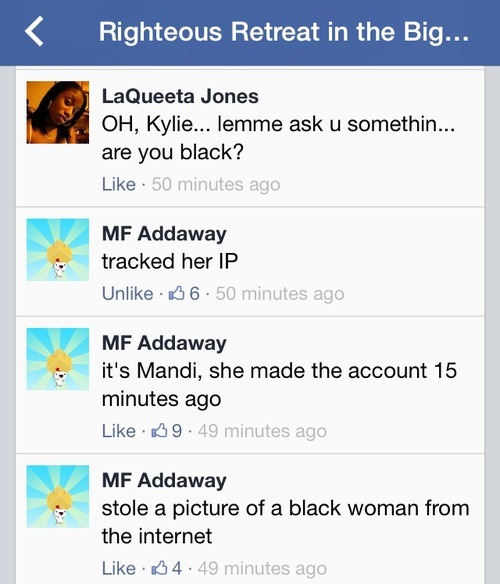In a
wonderful essay by Lauren Jackson on how some of the internet’s most popular memes are saddled with intrinsic racism, Jackson describes something called “digital blackface,” in which a white person dons the persona of a black person online, even attempting to adopt stereotypical “black” vernacular:
Many have used the phrase “digital blackface” to describe the odd and all-too-prevalent practice of white and non-Black people making anonymous claims to a Black identity through contemporary technological mediums such as social media. It often involves masquerading behind the Black face of a fictional profile picture. These attempts, while hilariously transparent, take advantage of the relative anonymity of the internet to perpetuate decontextualized stereotypes and project an image of Black people that fits the desire of anti-Black individuals.
It goes undocumented and unaddressed in most cases, though occasionally the people behind the blackface are unmasked. When musician, alleged feminist, and keen event planner Ani Defranco came under censure after revealing a former slave plantation as the locale for her Righteous Retreat, a workshop for creatives, fans flocked to the event’s Facebook page in support of the gathering (and to attack its detractors), including “LaQueeta Jones.”
LaQueeta Jones’ comments include gratuitous usage of grammatically incorrect African American Vernacular English (AAVE), an evocation of MLK, and the bulletproof phrase of authenticity, “as a black woman.” An altogether weak attempt at internet minstrelsy, it prompted a skeptical Facebook user, MF Addaway, to track the IP address of “LaQueeta Jones,” and bust the actual account holder, Mandi Harrington—a white woman who had posted earlier in support of Defranco.


 To the person tracking her IP address. These internet racist piss me off more than the non-Internet racist cause they scary asses do all their work behind the computer.
To the person tracking her IP address. These internet racist piss me off more than the non-Internet racist cause they scary asses do all their work behind the computer.


